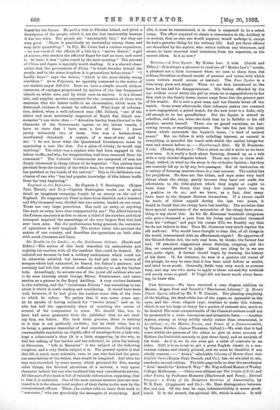NOVELS.—A Poor Squire. By Holme Lee. 2 vols. (Smith and
Elder.)—It is always a pleasure to read one of " Holme Lee's " novels,. a pleasure not a little increased when we turn to them from the tedious frivolities or dismal moods of passion and crime with which some writers would amuse or instruct. The Poor Squire is a love-story, pure and simple. When we are first introduced to the hero, he has bad his disappointment. His father, offended by the too evident ennui which the girl to whom he is engaged shows in her first visit to the family home, leaves away from him the greater part of his wealth. He is now a poor man, and her friends break off the match. Some years afterwards, their influence makes her contract a new engagement, a grand match, for the new lover is a duke, only old enough to be her grandfather. But the Squire is stirred to rebellion, and she, too, when she finds that he is faithful to his old passion, asserts herself. There are no grand emotions, no har- rowing scenes, or startling surprises. The tale has just the quiet charm which surrounds the Squire's home, "a land of ancient peace." But we follow it with unfailing interest, so natural is everything, so graceful the tench with which the anther brings her men and women before us.--Farnborough Hall. By H. Simmons. 3 vole. (Tinsley Brothers.)—This is about as odd a novel as we have ever seen. It is really a book about farming, dressed up as a tale with a very slender disguise indeed. There are two or three wed- dings, indeed, to wind up the story in the orthodox fashion ; but they are scarcely led up to by any love-passages. But of instruction on a variety of farming matters there is a vast amount. The author has his prejudices. He does not like tithes, and says some very hard things about the clergy, partly because they have not made the allowances to the tithe-payers which they might or ought to• have done. We fancy that very few indeed have been in a position to do so ; and we know, as a fact, that many have been in the deepest distress, themselves. If a return could be made of tithes unpaid daring the last two years, it would be found that the clergy have lost terribly. The societies that have special cognizance of the necessities of the clergy have some- thing to say about this. As for Mr. Simmons' beneficed clergyman who gets a thousand a year from his living and another thousand from his "college," and pays his curate £70, we frankly say that we do not believe in him. Then Mr. Simmons very much regrets the old malt-tax. Who would have thought to hear this, of all things in the world, remembered with an affectionate regret ? He approves of the Ground-Game Act, the only real boon, he thinks, the farmer has had. Of practical suggestions about draining, cropping, and the• like, we cannot pretend to judge. About one thing he is, we are sure, quite right. A farmer should begin by learning the history of his farm. If, for instance, he sees in a pasture old traces of the plough, he may be sure that it has been tried before as arable, and tried to no profit. Generally, fields vary very much as persons vary, and any one who seeks to apply to them cut-and-dry methods- will surely come to grief. If Virgil did not know much about farm- ing, he knew this.
































 Previous page
Previous page